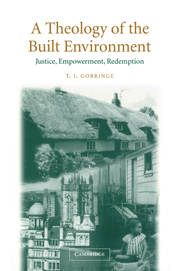Book contents
- Frontmatter
- Contents
- Preface
- 1 The theology of the built environment
- 2 Constructed space and the presence of God
- 3 The land
- 4 The human dwelling
- 5 From Eden to Jerusalem: town and country in the economy of redemption
- 6 The meaning of the city
- 7 Constructing community
- 8 But is it art?
- 9 God, nature and the built environment
- 10 Towards Jerusalem?
- Select bibliography
- Index of names
- Index of subjects
3 - The land
Published online by Cambridge University Press: 22 September 2009
- Frontmatter
- Contents
- Preface
- 1 The theology of the built environment
- 2 Constructed space and the presence of God
- 3 The land
- 4 The human dwelling
- 5 From Eden to Jerusalem: town and country in the economy of redemption
- 6 The meaning of the city
- 7 Constructing community
- 8 But is it art?
- 9 God, nature and the built environment
- 10 Towards Jerusalem?
- Select bibliography
- Index of names
- Index of subjects
Summary
The land shall not be sold in perpetuity, for the land is mine; with me you are but aliens and tenants.
(Leviticus 25.23)Space is constructed, but land, property, territory, is possessed. After an ontology of space the most fundamental presupposition of any theology of the built environment – and potentially the most politically explosive – is a theology of the land. Without land we cannot live, but how is it to be allocated and husbanded? Hilaire Belloc described human beings as ‘land animals’ because ‘[t]he very first condition of all, viz, mere space in which to extend his being, involves the occupation of land’. The problem is that, even before pressures of population became serious, land for some has, at least since the agricultural revolution in Neolithic times, meant dispossession for others as it does today in the Balkans and in Palestine. And conquest has left the world littered with struggles for autonomy – in Chechnya and Tibet, in Sri Lanka, in Kurdistan, in Sudan. Always and everywhere land is both vital for sustenance and for all the goods of identity, but at the same time one of the most obvious foci of aggression.
Even in relatively peaceful and stable democracies land is problematic.
- Type
- Chapter
- Information
- A Theology of the Built EnvironmentJustice, Empowerment, Redemption, pp. 50 - 78Publisher: Cambridge University PressPrint publication year: 2002



